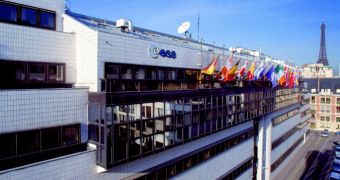The European Space Operations Centre (ESOC) is now powered by SUSE Linux Enterprise Server and it's making a firm commitment towards open source and Linux software.
This is not exactly something completely unexpected. The European Space Agency and OpenSuSE have been friends for a few years, but now the level of implication manifested by both parties has gone beyond the adoption of a Linux distro.
“With 390 instances of SUSE Linux Enterprise Server already deployed, and a further 50 to be deployed in 2013, ESOC is enjoying faster installation, better control over system configuration, excellent performance and reliability, strong technical support from SUSE, and the confidence that it has an operating system that it can maintain for the long term.”
“Further deployment of SUSE Linux Enterprise Server is under consideration for the remaining antennas in the network (15m diameter class, used mainly for near-Earth missions) and for mission control for new spacecraft missions currently under preparation,” reads the announcement.
Many of you might be more familiar with NASA, but this is the European counterpart. The agency is involved in a number of projects and some of them are quite famous. In fact, one in particular has captured the news cycle, and that is the European space orbiter Rosetta, which is now circling the also famous 67P/Churyumov-Gerasimenko comet.
It's also a well-known fact that many, if not all scientific endeavors, are now being powered by Unix solutions or at least open source software. The International Space Station (ISS) is using Debian and Ubuntu systems, the Fermi laboratories are using Scientific Linux, which is based on Red Hat, CERN (with the Large Hadron Collider) is doing the same, and these are just a few of the most prominent ones.
It's not really a surprise that the deployment of SUSE Linux Enterprise Servers has been recommended by the IT department of The European Space Operations Centre (ESOC), especially after the successful integration of openSUSE.
The Senior IT engineer at the European Space Operations Centre, Eduard Hogg, explains that SUSE Linux Enterprise Server allows them to implement patches and fixes in a timely manner and that it provides them with control over the software licenses.
He also goes on to say that YaST and AutoYaST are being used to create, maintain, and automatically deploy different configurations of SUSE Linux Enterprise Server for different requirements.
More details about the implementation of SUSE Linux Enterprise Server can be found on suse.com.

 14 DAY TRIAL //
14 DAY TRIAL //